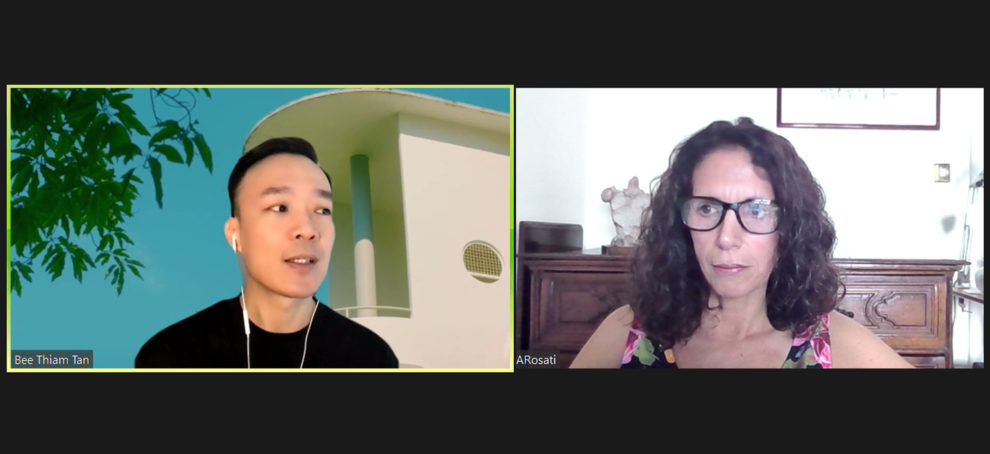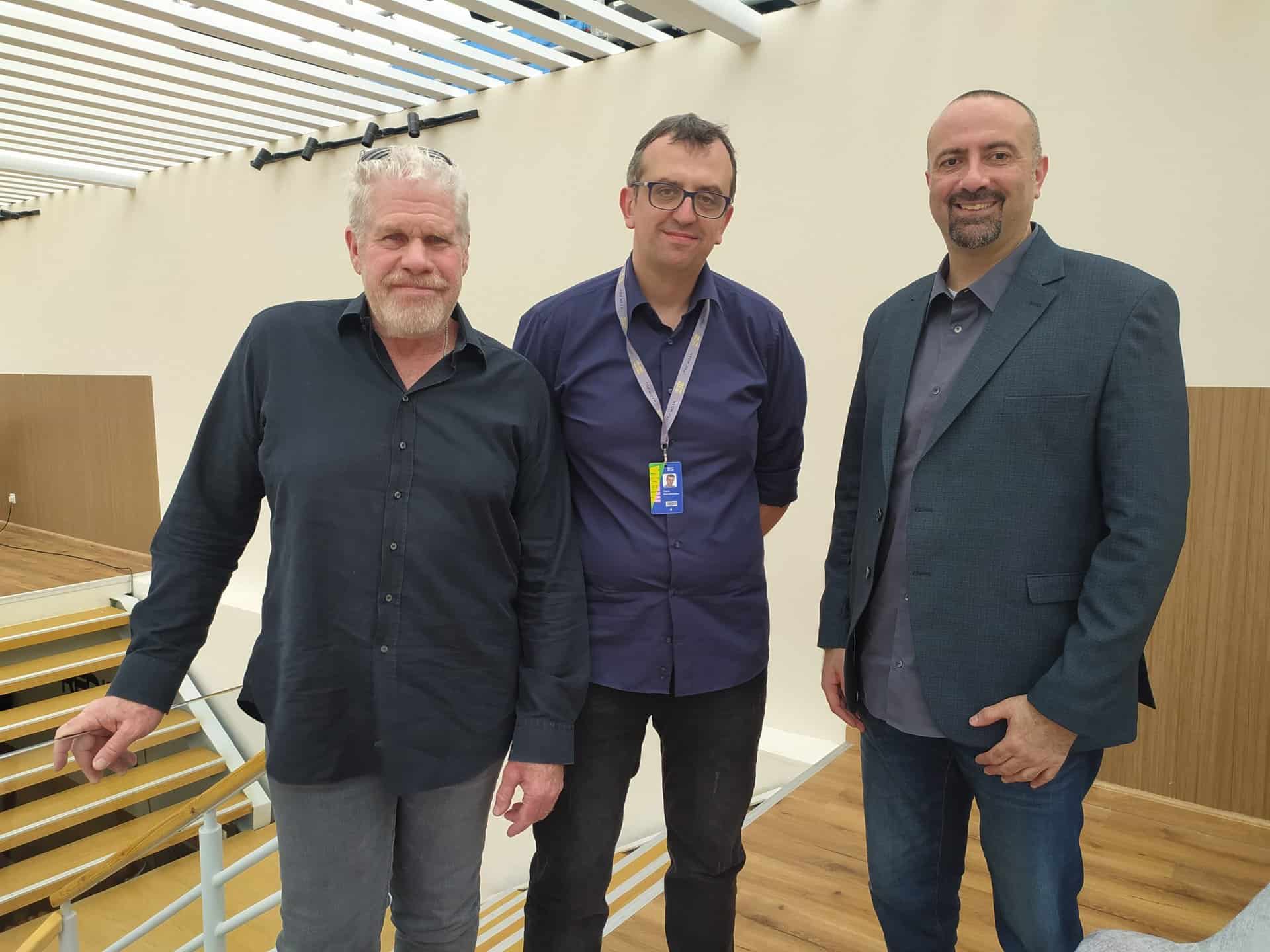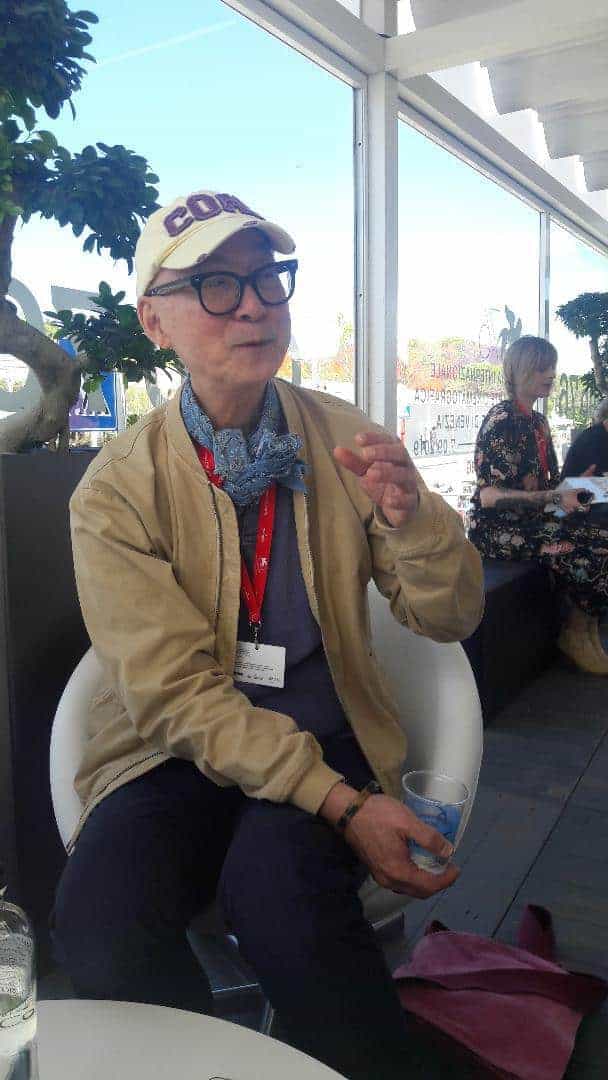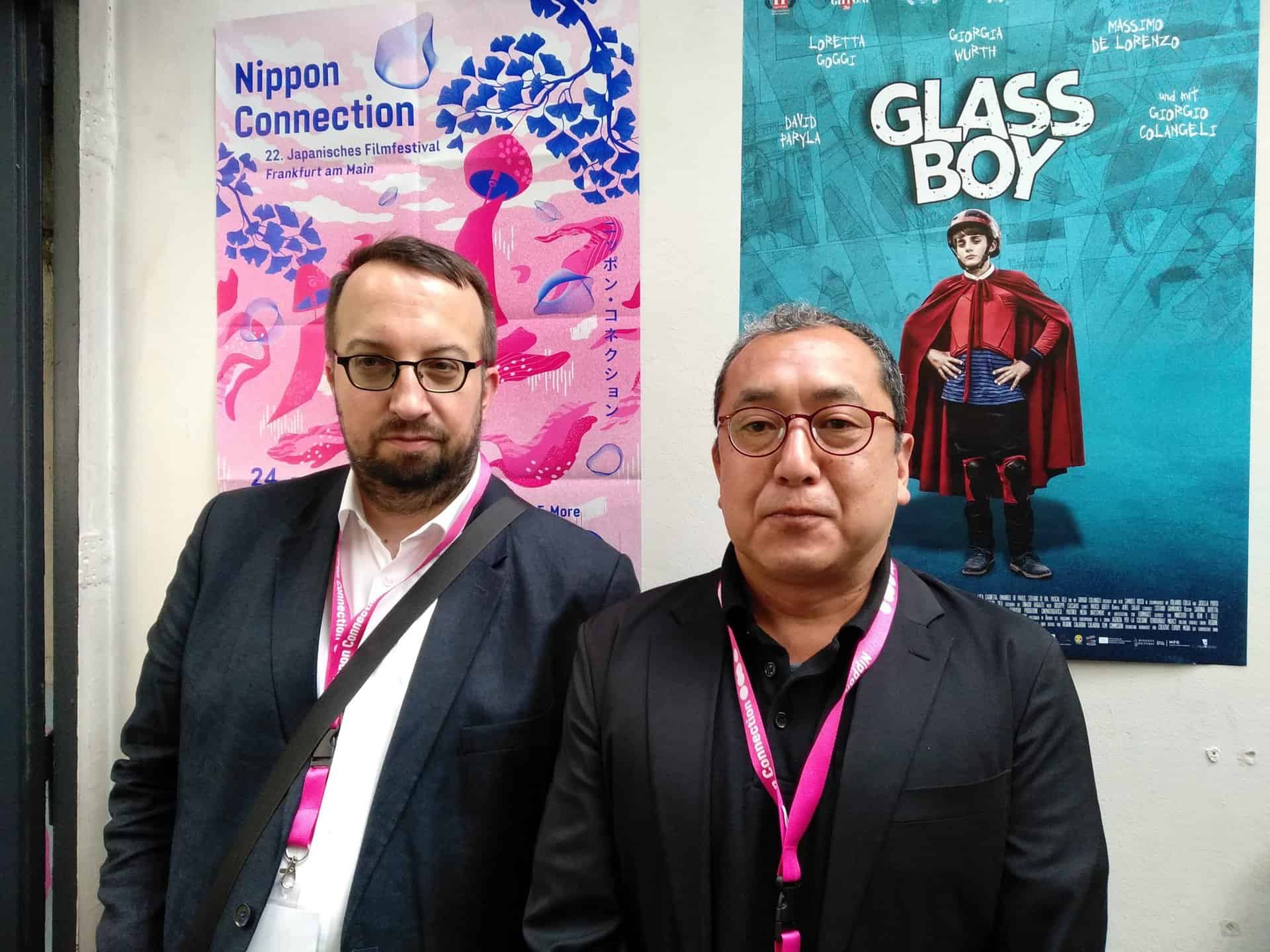Tan Bee Thiam is a Singaporean producer, director, writer and editor with the 13 Little Pictures, an independent film collective, based in Singapore.
An alumnus of Berlinale Talents, Rotterdam Lab, and European Audiovisual Entrepreneurs (EAVE), he produced ”Revenge of the Pontianak” (2019), ”Demons” (2018), ”Snakeskin” (2014), ”03-Flats” (2014), ”As You Were” (2014), ”Eclipses” (2013), ”Red Dragonflies” (2010), ”In the House of Straw” (2009) and ”White Days” (2009). As a director, his works include “Kopi Julia”, one of 13 short films curated by Apichatpong Weerasethakul for the Sharjah Biennale. His co-directorial feature “Fundamentally Happy” was shot by Christopher Doyle and premiered at the Tallinn Black Nights FF 2015. His first feature film is “Tiong Bahru Social Club”.
On the occasion of his first feature film “Tiong Bahru Social Club” screening at New York Asian Film Festival (NYAFF), we speak with Tan Bee Thiam about two Singaporean architectural giants, parental expectations, the importance of harmony and the yin and yang in life, and much more
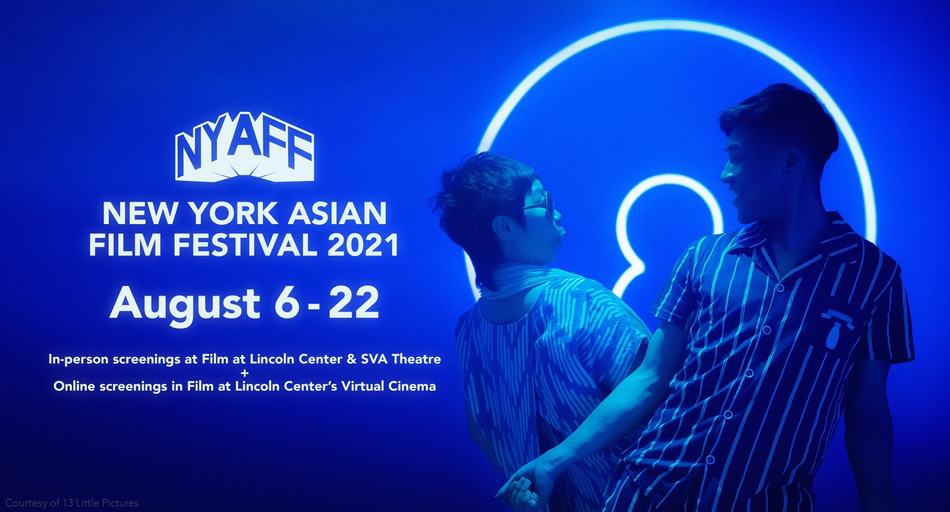
“Tiong Bahru Social Club” is a gentle retro-futuristic comedy that invites us to reflect about the intrinsic correlation between our personal happiness and the community we live in.
As recurring settings in the film, there are these two Singaporean architectural giants, the Art Deco Tiong Bahru Complex and the nearby brutalist Pearl Bank Block. (it was really exciting to discover them through you film) Can you tell us what is your personal connection with these places and if you made a connection with their actual residents during the writing stage or the shooting?
I think that the early memories of Tiong Bahru and Pearl Bank come from my childhood because my grandmother lived near Tiong Bahru. Every weekend, when my dad drove us to visit my grandma, we would always pass by a building which looks like a UFO, and that is Pearl Bank. My impression of Tiong Bahru is always of a very laid-back place where you go to have really nice food. But of course that was like almost 20 years ago, Since it was gazetted for conservation in 2003, it all upgraded into something that is very “spick and span”. Hip cafes and eateries have set up shop in the estate, and young families have also moved in. It was even voted world's top 5 coolest neighbourhoods by Vogue. You won't find these hipster cafes in the film. What I featured instead was the 70-year old Hua Bee kopitiam (coffee shop) with tiled walls and marble table tops. This also happens to be where Eric Khoo's Mee Pok Man was shot in 1995!
And the Pearl Bank building doesn't exist anymore, it has been demolished. So maybe your film caught the last appearance on screen of it.
Yes. In fact, I think that there weren't really a lot of films shot in Pearl Bank, from what I can remember. Yeah, there were only like probably a handful of short films. I think “Tiong Bahru Social Club” is actually the first movie that features this very iconic building. When we finished shooting in 2018, we spent about one year editing, but also waiting to shoot the final scene, because we knew that the residents had been asked to leave, one by one, and they were moving out already when we were shooting there, and they were just waiting to pull down the building and to build a new condo over it.
There is an undercurrent theme of a lovely mother-and-son relationship here, with Ah Bee's mum concerned about her son's future and pushing him towards the Tiong Bahru Social Club experience. Family is very important in Singaporean society, I can relate to that, as an Italian. Do you think family and parent's expectations play an important role in finding – or I could say missing – happiness?
Absolutely. One of the films, which I put all my cast and crew to watch before going into production is actually “Late Spring” by Yasujiro Ozu, about a daughter and father story, and also about what they said about happiness and the future. A lot of parents, I think, always feel that their children have to leave so that they don't become a burden to them. But I see in my generation of people that, we want to actually take care of our parents. So, it is a story about that. My mom is always asking me when I'm ready to get married, find a new place and move out, and I know as well that she would very much want to see me and my family, just as how I have visited my grandma when I was young. And as a teacher as well, every year I have to teach this module called “Education and Career Guidance” to my students, which is also about how to have a successful career, how to build up your portfolio and what career satisfaction is to them, and stuff like that. And it always gets me thinking: “well, is there only one path to success and how we treat our students to think of happiness?” Yeah, so that was really it. This was really inspired by my story with my mom, as well as my experiences with my students.
Is that why you have the character of the mom in the film?
Yes. The mom was always there. It was the first thing that I wrote. I thought that this would be a film for my mother and all mothers in the world. And I had in mind that I really wanted to bring my mum to watch the film. Yeah, that was what I had in mind when I was making it.
One of the best things and feelings in the film is the positive and serene attitude of Ah Bee, even when he realises that he might have taken the wrong path/decision and is facing a change of plan. Do you want to elaborate a bit about this?
I think when I was writing the character of Ah Bee, I saw him as a cat, someone who is quite Zen and canine because the environment caused him to move in a certain way. Just like, I think, students that I have. They are always playing in the playground, either games or amongst themselves. But I think as teachers, we always have a sense of panic and anxiety for them, so that they will then get nervous and anxious and hopefully back up and do all their tests and then they will be successful in the future. I think it was the same kind of plan. But when I was writing this character as well, I had in mind the Yin and Yang, in the whole universe of Tiong Bahru Social Club, I was striving for a coexistence of the Yin and the Yang. The film is structured into two halves. It opens with a question – To Be or Not to Be(e), and ends with the song, “Choices” by Charlie Lim. The first half is about filling the glass full, and the second half is about emptying it. In the first half, he is trying to become someone that he is not. And in the second half he is at peace with himself, just accepting and following what the universe wants him to do. When he submits himself to the Taoist Philosophy of non-action (wu wei), things come full circle.
And you find that kind of Yin and Yang in with almost everything that we do. Because I feel that what I'm trying to achieve is not something that is singular. What I want to achieve is harmony and to get harmony, I need the polar opposites of two different things. The past and the future, the old and the young, you know, something that is calming like elevator music with something that is robotic, as if it is electronic and created by a robot, like Kraftwerk-inspired music. So that is what we planted and how it guided us to make the movie, to create a story and to create all different characters.
So, are these harmonies that you are talking about, your idea of happiness?
Yeah, absolutely. I think that being able to find the harmonious Yin and Yang right in your life is what will give you peace.
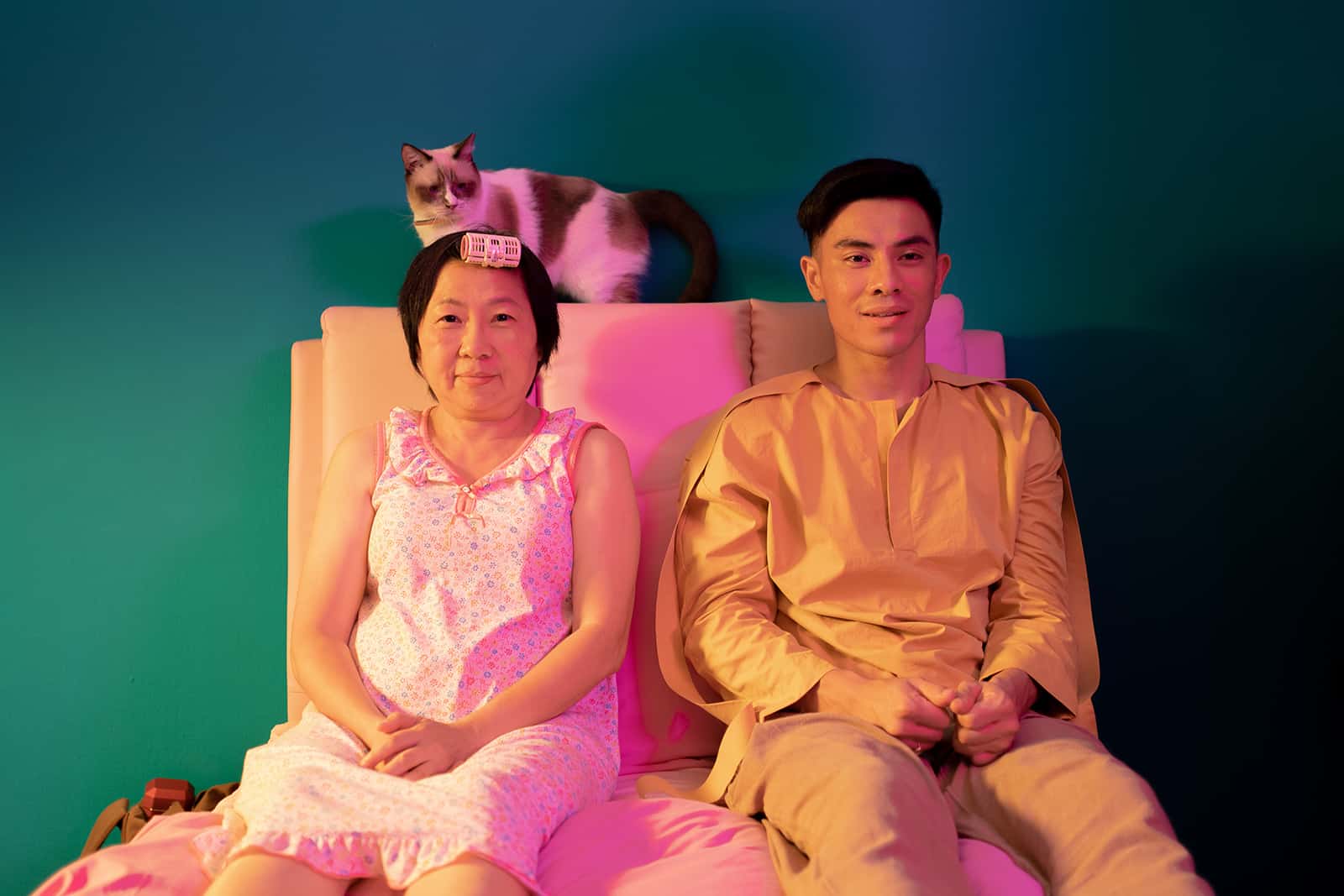
Watching the film, you can really feel that the production design, costumes, lights and photography, the music score, even the graphic design of the titles and posters, it was all a wonderful team-effort to create the Tiong Bahru's Universe. How difficult was to put together such a dream team and then work with them?
I really have, like you said, a dream team that shares the collective vision and they also contributed tremendously to make the film what it is. I think that, as a director, I share a lot and I also share a lot of my responsibilities. This means that I'm always asking them for their opinion, and I'm always getting them to share with everyone as well, so that everyone knows what we are doing. And some of the ideas here do not come just from me, but from everyone. I think even on sets, when we go for a take, once I get what I want for it, I encourage my actors to have their own interpretation and I would give our one back to them, to be able to do what they want and to show us. And sometimes from what the actors do, my production designer might have an idea and they would suggest something else. Or the costume designer or the DOP might have other ideas and then come together, like to do something. So, it was really a very collaborative process, which I enjoy thoroughly. I don't believe in the director as a dictator. Yeah, I feel that, especially when we are making such a film we have to embrace the collective.
You make it sound like it was fun as well.
Yeah. I think everybody really had a lot of fun because they can see that it is not just a film, it is “our” film. We were giving ideas very generously. And sometimes even when we have a break, you know, we would stay on set to go hang out with one another. Yeah, it was a really fun shoot.
What about the wonderful actors? Thomas Pang in the role of charming Bee, veteran actresses Goh Guat Kian as mum Mui and Jalyn Han as Ms Wee, they are all very pleasurable to watch. Can you tell us about the casting process?
We did two runs of casting actually. For the first, we had a script and then we did a casting and there were people who came for the audition, but after we did the first round of casting, we realized that we needed to tweak the script. Yeah. Because I think we used the audition as well to see whether the script worked right then when actors tried to interpret it. Then we spent another whole year to rewrite the script, and then we had the second round of casting. And that was, I think in the end of 2017, beginning of 2018. And then there were, of course, actors I really wanted to work with, such as Thomas (Pang), such as Jalyn (Han), such as Guat Kian (Goh) and others. I'd been following their works in theatre and I knew that I wanted to make a work which would challeng them in terms of the roles that they have been given so far, and to tap into their strengths as well, from a creative background, to do something which would fit the film. Some of them are really veteran actors, I think they worked for 20, 30 years in Singapore, but this is actually their movie debut. For Jalyn, Noorlinah (Mohamed), Munah (Bagharib), Thomas, this is actually their first film. I'm really glad I was able to bring them together, and because theatre actors are so popular, high-demanded actors, we had to book them at least half a year in advance, so then the production started in August, eight months later.
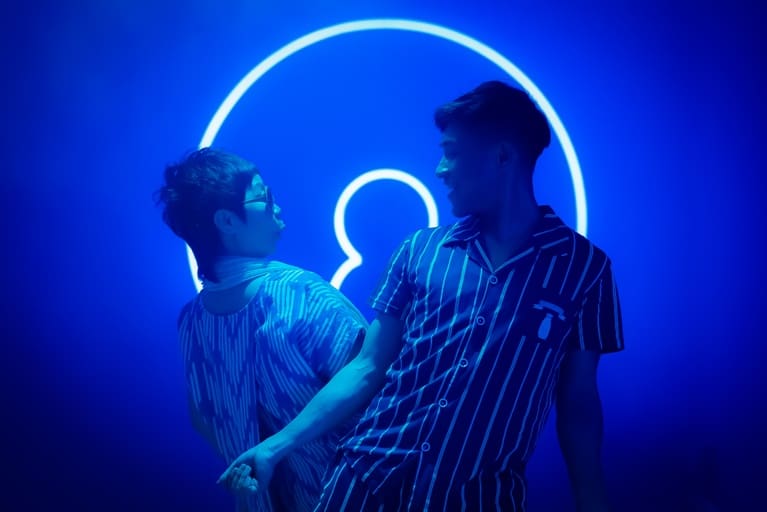
Can you mention to us the major obstacle you encountered during your journey?
I think one of the major obstacles we had, and which was really a scare, was the insecurity of one of the locations. I think, about 1, 2 months before shoot there was a location initially that we wanted to build the set of Tiong Bahru Social Club but after going to and forth for a month, the authorities said that we couldn't shoot there anymore. So, we had to find a place to build the whole set of Tiong Bahru Social Club. And it was really very lucky of us to find this 1970s bungalow and that they were able to give us the place. And so that was where we built the communal living space where all the happiness agents live.
I'm quite curious to know about the reaction and the feedback that you got from the local audience. How did the film make it to the local box office and also abroad?
The film was released in Singapore in December last year and it went all the way until April and I think that, although there was the pandemic, therefore there were limited kind of sitting capacity, we are really glad to be able to play full house audiences for a couple of months. I think the film really attracted a new generation of audience and I feel that it excited them because it is something that visually – and I think story-wise – it's different from what they had seen before in Singapore cinema. I think it's something that we were not very confident of initially, whether people would like it or not. Then the film went out and we got to find a group of young audience that really loved the film. And of course, there are also people who find it not populist enough because it was so quirky. It was not what they expected, in comparison with Hollywood films. So, those audiences, I think they were a bit disappointed. But I think above anything, we really cherished the chance to do something different and to give something refreshing to the audience.
Abroad, the film has played in a couple of festivals, but I think for festival circuits it is on and off. Sometimes there was going to be a lockdown again, and so there was no screening anymore. And even when it happened, sometimes it was very last minute that the call went up again. It was really on and off, but I think it is looking good now and we are happy. I'm really, really glad to have the North American and US premier at New York Asian Film Festival.
The last question is about your future project. I know you are also a lecturer and very busy, but are you working on another movie?
Well, I am working on two projects now, but I see myself as someone who really loves cinema, and it doesn't matter whether it is a film that I direct. I can produce, I can edit, I can write, I can act as a small character in the background, I will do anything. Yeah, I think that's really how I see myself as a filmmaker and how I see all my collaborators as fellow filmmakers, my DP, editor, or the production designer, or my production assistant. So, at the moment I'm producing for two filmmakers, Daniel Hui (“Demons”, “Snakeskin”) and Glen Goei (“Revenge of the Pontianak”) on their next feature film, which I'm really very excited about. One is an animation and the other is a black and white, 16mm film. So, yeah, we are working on those now.
Well, good luck with that!


